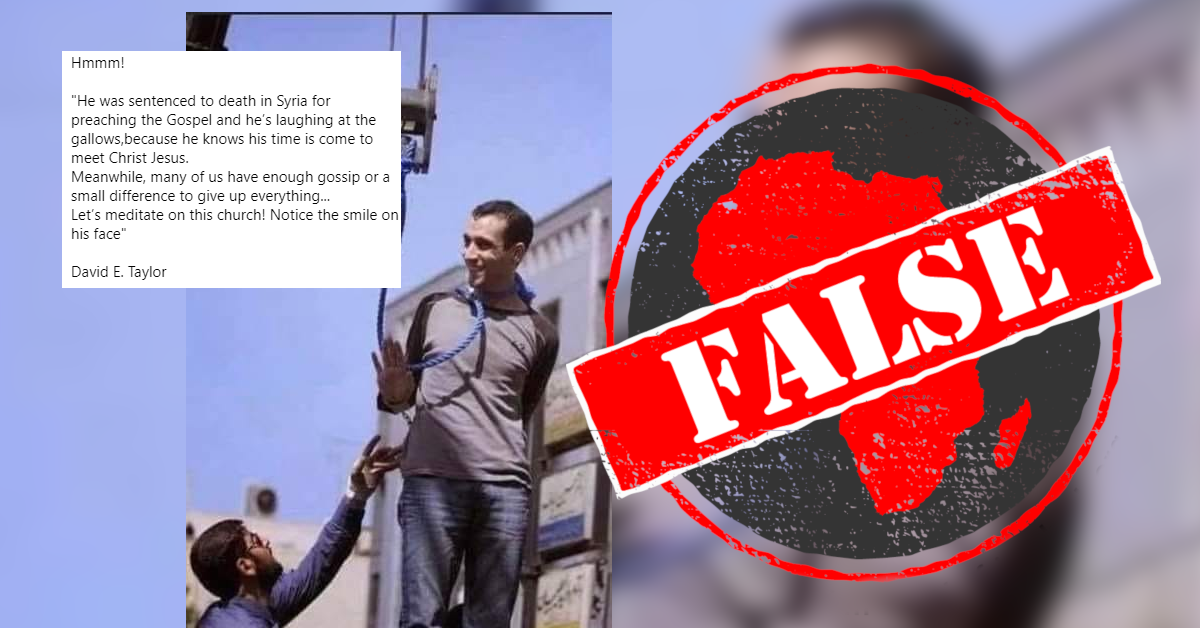“He was sentenced to death in Syria for preaching the Gospel and he’s laughing at the gallows, because he knows his time is come to meet Christ Jesus,” reads the caption of a photo posted on a Facebook group – with members in both Nigeria and the UK city of Manchester – on 11 September 2011.
The photo shows a man with a noose around his neck, his arms chained at the elbow and one hand raised in a wave. The man is smiling.
The man was executed, but not in Syria and not for “preaching the gospel”. This and other photos of his execution have been posted on Facebook with false captions at least two times before.
Here’s the real story.

The man in the photo is Majid Kavousifar, who was publicly executed alongside his nephew, Hossein Kavousifar, on 2 August 2007. The pair were hanged in Tehran, the capital of Iran, for killing judge Hassan Moghaddas two years before, to the day.
According to the BBC, Moghaddas was “known for adjudicating in political cases and cases where Iran's Islamic revolutionary system had been criticised”. Kavousifar had reportedly thought the judge was corrupt.
The execution was said to be the first public execution in Iran’s capital since 2002. It took place not only on the two-year anniversary of the killing, but outside the building where the judge was shot.
The execution was one in a sharp rise in executions in Iran during the presidency of Mahmoud Ahmadinejad. Ahmadinejad was controversial for, among other things, denying the Holocaust and a disputed election that won him a second term. His presidency ended in 2013.
Photos showing the hanging of Majid and Hossein Kavousifar have been shared out of context before.
In May 2019 they went viral on Facebook with the false claim that “this man was hanged in Iraqi [sic] for refusing to denounce Jesus Christ”.
In February 2020 one of the photos was used to claim that Algerian hacker Hamza Bendelladj, arrested for computer crimes in the US in 2013, had been executed. This claim was also false. In 2016, a US court sentenced Bendelladj to 15 years in prison. – Keegan Leech
The photo shows a man with a noose around his neck, his arms chained at the elbow and one hand raised in a wave. The man is smiling.
The man was executed, but not in Syria and not for “preaching the gospel”. This and other photos of his execution have been posted on Facebook with false captions at least two times before.
Here’s the real story.

Public hanging in Iran in 2007
The man in the photo is Majid Kavousifar, who was publicly executed alongside his nephew, Hossein Kavousifar, on 2 August 2007. The pair were hanged in Tehran, the capital of Iran, for killing judge Hassan Moghaddas two years before, to the day.
According to the BBC, Moghaddas was “known for adjudicating in political cases and cases where Iran's Islamic revolutionary system had been criticised”. Kavousifar had reportedly thought the judge was corrupt.
The execution was said to be the first public execution in Iran’s capital since 2002. It took place not only on the two-year anniversary of the killing, but outside the building where the judge was shot.
The execution was one in a sharp rise in executions in Iran during the presidency of Mahmoud Ahmadinejad. Ahmadinejad was controversial for, among other things, denying the Holocaust and a disputed election that won him a second term. His presidency ended in 2013.
Out of context
Photos showing the hanging of Majid and Hossein Kavousifar have been shared out of context before.
In May 2019 they went viral on Facebook with the false claim that “this man was hanged in Iraqi [sic] for refusing to denounce Jesus Christ”.
In February 2020 one of the photos was used to claim that Algerian hacker Hamza Bendelladj, arrested for computer crimes in the US in 2013, had been executed. This claim was also false. In 2016, a US court sentenced Bendelladj to 15 years in prison. – Keegan Leech
Republish our content for free
For publishers: what to do if your post is rated false
A fact-checker has rated your Facebook or Instagram post as “false”, “altered”, “partly false” or “missing context”. This could have serious consequences. What do you do?
Click on our guide for the steps you should follow.
Publishers guideAfrica Check teams up with Facebook
Africa Check is a partner in Meta's third-party fact-checking programme to help stop the spread of false information on social media.
The content we rate as “false” will be downgraded on Facebook and Instagram. This means fewer people will see it.
You can also help identify false information on Facebook. This guide explains how.


Add new comment